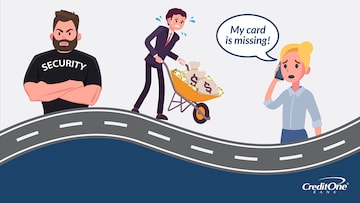January 11, 2021
Are you hearing the call of the open road but it’s been a while since you’ve heeded it? Here are a few reminders on how to stretch your travel dollar.

As places start to reopen after months of COVID-19-related restrictions and shutdowns, many Americans are ready to start traveling again. But it’s been so long since many of us have traveled that we may be a bit rusty. Plus, with the economic challenges and hardships that have impacted many Americans because of the pandemic, stretching a travel budget is more important than ever for price-conscious travelers looking to hit the road again.
Here are a few tips and reminders to help keep your travel budget manageable on your next trip.
Plan in Advance
No matter how anxious you are to get out there and travel, unless you happen upon last-minute travel deals, you’re typically more likely to find better deals by booking a trip at least 30 days in advance of your departure date. Booking in advance could save you money on flights, hotels, rental cars, and more. If your reservations allow free cancelations, booking in advance gives you time to search for even better deals while providing you with peace of mind that you already have a trip reserved.
Let Deals Dictate Destinations
Rather than be adamant that you’ll only travel to Destination X on a specific date, keep an open mind as you research your travel options. Instead of having your destination dictate the deal you get, consider letting the deal determine your destination. For example, say you’re planning a family vacation to Disneyland in Southern California but, as you start researching prices, you find that a trip to Disney World in Florida is significantly more affordable. Both options provide plenty of sun and family fun, so why not opt for the Florida trip and save some money?
Travel During the Low or “Shoulder” Season
That same Disneyland (or Disney World) trip is likely to be less expensive during winter months (other than over the holidays) than at the height of summer. Obviously, there are some trips you wouldn’t want to take during the offseason, such as a ski trip to Utah during the summer. While it’s certainly possible to have a lovely time in Utah in the summertime, your trip almost certainly wouldn’t involve skiing.
That’s where shoulder seasons come into play. Shoulder season is the period of time that falls between a destination’s low and high seasons. While prices may not be as cheap as during the low season, they’ll likely be noticeably less than high-season prices. So, using that same Disneyland trip as an example, rather than taking the family there in July, at the height of the summer season, or in February, low season, consider planning that trip for early October. Chances are you’ll experience lower prices, significantly smaller crowds, and still enjoy decent weather.
Do the Math on Driving vs Flying
To fly or not to fly? That is the question would-be travelers frequently wrestle with. While driving may sometimes be cheaper than flying, it’s not always the case. When you factor in the price of gas, wear-and-tear on your car, the extra time it may take you to drive, and the fact that you may be able to find very competitive airfares, flying could actually be a more economical choice. But you need to crunch the numbers to make the most informed decision.
Obviously, some trips, like going to Hawaii, are not drivable, so flying (or perhaps a cruise) is really your only option. If you’re leaning toward flying, also factor in other expenses you’ll incur with air travel, such as airport parking, taxi or ride-share fees, a car rental once you reach your destination, or more. Conversely, if you’re leaning toward driving to your destination, don’t forget to include costs you’ll incur on the road other than gas and wear-and-tear, such as meals, motel rooms, or parking once you reach your destination, which can be substantial if you’ll be parking in a major metropolitan city.
Eat Out Less
The cost of eating in restaurants can add up quickly, especially if you’re traveling with the whole family. Offset some of those costs by cooking or picnicking whenever possible. Not only will you save money, you’ll probably also eat healthier. Don’t deprive yourself from experiencing the local cuisine of your travel destination, but try limiting the number of times you dine out to stretch your dollar further.
Consider Shorter Trips (Both Distance & Time)
There are several good reasons to take a shorter vacation, but one of the main ones is that a shorter getaway could be noticeably cheaper than a longer holiday. That’s because you’re spending money over the course of fewer days. It’s obviously not always the case that less days on vacation equals less money. For example, three days at a five-star beach resort will probably cost significantly more than seven days of camping in the woods. But, in general, shorter getaways tend to be cheaper than longer vacations.
The same generally holds true for distances. It’s typically cheaper to travel a shorter distance than a longer one, especially by car. By air, this may or may not be true, depending to a large extent on where you live, where you’re headed, how many flights there are (if any) to your destination, and whether there’s a major airport anywhere near you.
Consider Alternatives to Hotels
If a must-have of your trip is to be pampered in at a five-star hotel, then go ahead and skip ahead to the next section. But, if you plan on primarily using your accommodations for sleeping, then why spend a fortune on a room in which you’ll mostly be closing your eyes? Consider alternatives such as vacation rentals, short-term house or apartment rentals, B&Bs, or even budget motels. You may not enjoy 1,000-thread-count sheets, but you may be able to apply some of the money you save on lodging toward creating other more lasting memories on your trip.
Use a Credit Card Instead of Cash
If you’re using a credit card to finance a trip for which you don’t have the funds, then, no, a credit card will probably not save you any money. You’ll likely pay more in interest charges than any benefits or savings you’ll enjoy by using a credit card. But, if you use a credit card as a substitute for cash—as in you have the funds to pay your credit card bill in full when it comes due—then a credit card could save you money and offer additional benefits. Especially if it’s one of these types of credit cards:
A Rewards Card: Rewards credit cards provide you with rewards in any number of forms, including but not limited to cash back rewards, points, or airline miles. You earn these rewards by using the credit card to pay for eligible purchases, which are defined by the credit card issuer. So, if you were to use a cash back rewards credit card to pay for trip purchases that are eligible to earn cash back rewards, the cash back rewards you earn could help offset some of the trip’s cost.
A Travel Rewards Credit Card: Travel rewards credit cards are rewards cards that are geared toward travel. They typically reward you with compensation that can be used for travel or travel-related purchases. Again, that compensation typically comes in three forms: cash back rewards, points, or airline miles. So, say you use your travel rewards card to make eligible purchases that earn you points that can be redeemed for hotel stays. If you earn enough points, you may be able to use them for a free (or discounted) hotel stay on your trip. Or, if your travel rewards card rewards you with airline miles on eligible purchases, you may be able to cash in those miles to pay for all or some of your trip’s airfare.
Even if your credit card isn’t considered a rewards card, it could still potentially save you money on a trip. For example, it may offer complimentary travel insurance or supplemental rental car insurance, which could save you money should you need to cancel a trip purchased with that card or if you rent a car with that card.
If you’re itching to pack your bag and satisfy your travel jones, with a little planning and vigilance, you can still do so on a budget. If you’re not quite ready to get out there, the good news is that gives you even more time to plan for your first post-pandemic getaway, which could save you even more money. No matter where you stand, there’s no time like the present start dreaming about and planning for a trip that will reinvigorate your passion for hitting the road.
Looking for a credit card that could earn you cash back rewards on eligible purchases? See if you Pre-Qualify for a Credit One Bank card in less than a minute—without harming your credit score.
After realizing he couldn’t pay back his outrageous film school student loans with rejection notices from Hollywood studios, Sean focused his screenwriting skills on scripting corporate videos. Videos led to marketing communications, which led to articles and, before he knew it, Sean was making a living as a writer. He continues to do so today by leveraging his expertise in credit, financial planning, wealth-building, and living your best life for Credit One Bank.



